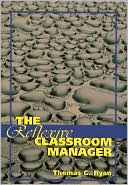

 |

|

The average rating for The Reflexive Classroom Manager based on 2 reviews is 3 stars.
Review # 1 was written on 2015-09-14 00:00:00 Tariq Shams Tariq ShamsI have to write an essay on the metaphors that have been used to describe education in the new Australian Curriculum and thought it might be a good idea to get an overview of the kinds of issues that surround a concept like a curriculum. This book is written by an Australian theorist who also wrote a key concepts book I read last year on teaching Humanities. He is always clear and comprehensive. This book contains 30 key concepts, each as a single chapter, in five general parts. These look at curriculum from: the perspective of students, the perspective of teachers, curriculum planning and development, curriculum management, and finally curriculum ideology. I'm becoming increasingly interested in what a curriculum actually means and how we ought to create one. The obvious thing is that a curriculum is a course of study that is directed at some aim, or set of aims. These are the things we want kids to know when they finish school. Generally, to achieve this, we break school up into various subjects (maths, English, language, music) and then create sub-goals for each of these subjects as well. The question we may not think to ask is whether or not this (this way of dividing up a student's time at school) is something that makes sense - this teaching of separate subjects. What would be the implications of not teaching in this way? One of the problems, of course, is that we have always taught in this way - so, for example, asking a Maths teacher to teach 'across the curriculum' is likely to be resisted. But the real question we probably need to ask is what is it that we really do want our kids to learn? The problem here is that so much of what kids learn at school has been decided for them (in curriculum documents, for example) and that all too much of that places the kids in the position of passive receivers of learning. But surely what we ought to be trying to help kids learn - really learn - is how to be active and involved members of a democratic society. If that is the case, just how much does school prepare them for that role? If all they do at school is receive information and be assessed on their ability to reproduce that learning - then how would that training be any different from how people would be taught in a non-democratic society? You know, far too often the process is - here are the facts society has decided it is important for you to learn, your choices are limited to excluding yourself from learning, in when you will drop maths or when you will drop learning Japanese - other than that here are the scripts the teacher is to read out in class and here are the standardised tests you are to complete at the end of the subject to ensure you have retained (at least until the date of the test) more than half of the key facts we are chosen for you to learn. Trust is an interesting notion in relation to curriculum and a concept (either mentioned or implied) underlining much of this book. How much do we trust teachers to teach (if they are not strictly managed by curriculum documents), or students to learn (if not closely monitored) or schools to provide adequate resources and so on. The fundamental lack of trust is evident in our society's swing towards more centralised curriculum planning and high stakes testing (NAPLAN here in Australia). One of the things I have learnt from over more than a decade of trade union organising is that performance management, measurement and improvement schemes often achieved the exact opposite of their intended aims. At least part of the reason for this is that the unstated, but clear, intention of these schemes is surveillance and as such they are based on a fundamental lack of trust. People respond to this lack of trust in predictable ways. Too much of our education system seems to be based on perverse incentives. We inculcate into students the belief that marks are everything. That nothing else matters. This is the currency of schooling and this financial conversion of education produces dangerous side effects - not unlike the issues that arise when other social reward systems are replaced by financial reward systems - Predictably Irrational: The Hidden Forces That Shape Our Decisions makes this point extremely well. Our obsession with marks as the currency of knowing and learning corrals kids into subjects they are more likely to get good marks in rather than subjects they are more likely to learn from. The idea of playing-it-safe shouldn't be the key learning our kids take from school - but the cost of them 'taking risks' surely seem far too high. I find this a deeply troubling state of affairs. However, given that if I want to continue on in my studies I must achieve a 75% average I am also all too aware of the push towards doing what is likely to maximise my marks, rather than necessarily my learning. Quite simply, that can't be a good thing. This book has given me a broader conception of the key concepts of curriculum - mostly because curriculum is defined in much broader terms than I had ever really thought about before. I think it provides a good introduction to curriculum studies. |
Review # 2 was written on 2019-09-12 00:00:00 Troy Torgrimson Troy TorgrimsonUseful, and surprisingly less dry than most academic, how-to, summary books of its type. Still academic, obviously. If the subject of qualitative research via printed documentation, past and present, interests you, give this one a look. Otherwise, skip it. |
CAN'T FIND WHAT YOU'RE LOOKING FOR? CLICK HERE!!!